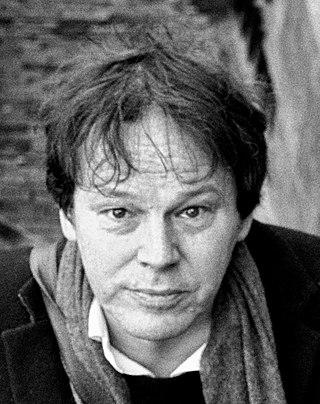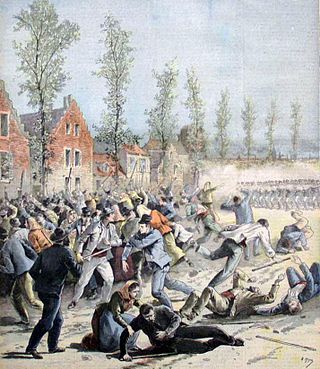
A black bloc is a tactic used by protesters who wear black clothing, ski masks, scarves, sunglasses, motorcycle helmets with padding or other face-concealing and face-protecting items. The clothing is used to conceal wearers' identities from both the police and politically different organizations by making it difficult to distinguish between participants. It is also used to protect their faces and eyes from pepper spray, which is used by police during protests or civil unrest. The tactic also allows the group to appear as one large unified mass. Black bloc participants are often associated with anarchism, anarcho-communism, communism, libertarian socialism and the anti-globalization movement. A variant of this type of protest is the Padded bloc, where following the Tute Bianche movement protesters wear padded clothing to protect against the police.

David Rolfe Graeber was an American anthropologist and anarchist activist. His influential work in economic anthropology, particularly his books Debt: The First 5,000 Years (2011), Bullshit Jobs (2018), and The Dawn of Everything (2021), and his leading role in the Occupy movement, earned him recognition as one of the foremost anthropologists and left-wing thinkers of his time.

Anarchism in Africa refers both to purported anarchic political organisation of some traditional African societies and to modern anarchist movements in Africa.

Fragments of an Anarchist Anthropology is one of a series of pamphlets published by Prickly Paradigm Press in 2004. With the essay, anthropologist David Graeber attempts to outline areas of research that intellectuals might explore in creating a cohesive body of anarchist social theory.
Anarchism in the United States began in the mid-19th century and started to grow in influence as it entered the American labor movements, growing an anarcho-communist current as well as gaining notoriety for violent propaganda of the deed and campaigning for diverse social reforms in the early 20th century. By around the start of the 20th century, the heyday of individualist anarchism had passed and anarcho-communism and other social anarchist currents emerged as the dominant anarchist tendency.
Anarchism in Greece traces its roots to ancient Greece but was formed as a political movement during the 19th century. It was in the ancient era that the first libertarian thoughts appeared when philosophers based on rationality questioned the fundamentals of tradition. Modern anarchism in Greece emerged in the 19th century, heavily influenced by the contemporary European classical anarchism. Because of the Bolshevik success in the Russian Revolution of 1917 and the rise of the Communist Party, anarchism faded after the first decades of the 20th century. The collapse of the military junta put an end to the monopoly of the political power from the Right, whereas the dissolution of the Soviet Union diminished the allure of the Communist Party of Greece allowing anarchist groups to gain pace in Athens and other cities.
Prefigurative politics are the modes of organization and social relationships that strive to reflect the future society being sought by the group. According to Carl Boggs, who coined the term, the desire is to embody "within the ongoing political practice of a movement [...] those forms of social relations, decision-making, culture, and human experience that are the ultimate goal". Besides this definition, Leach also gave light to the definition of the concept stating that the term "refers to a political orientation based on the premise that the ends a social movement achieves are fundamentally shaped by the means it employs, and that movement should therefore do their best to choose means that embody or prefigure the kind of society they want to bring about". Prefigurativism is the attempt to enact prefigurative politics.
Contemporary anarchism within the history of anarchism is the period of the anarchist movement continuing from the end of World War II and into the present. Since the last third of the 20th century, anarchists have been involved in anti-globalisation, peace, squatter and student protest movements. Anarchists have participated in armed revolutions such as in those that created the Makhnovshchina and Revolutionary Catalonia, and anarchist political organizations such as the International Workers' Association and the Industrial Workers of the World have existed since the 20th century. Within contemporary anarchism, the anti-capitalism of classical anarchism has remained prominent.

Occupy Wall Street (OWS) was a left-wing populist movement against economic inequality, corporate greed, big finance, and the influence of money in politics that began in Zuccotti Park, located in New York City's Financial District, and lasted for fifty-nine days—from September 17 to November 15, 2011.

The Occupy movement was an international populist socio-political movement that expressed opposition to social and economic inequality and to the perceived lack of real democracy around the world. It aimed primarily to advance social and economic justice and different forms of democracy. The movement has had many different scopes, since local groups often had different focuses, but its prime concerns included how large corporations and the global financial system control the world in a way that disproportionately benefits a minority, undermines democracy and causes instability.

Debt: The First 5,000 Years is a book by anthropologist David Graeber published in 2011. It explores the historical relationship of debt with social institutions such as barter, marriage, friendship, slavery, law, religion, war and government. It draws on the history and anthropology of a number of civilizations, large and small, from the first known records of debt from Sumer in 3500 BCE until the present. Reception of the book was mixed, with praise for Graeber's sweeping scope from earliest recorded history to the present; others raised doubts about the accuracy of some statements in Debt.

The People's Library, also known as Fort Patti or the Occupy Wall Street Library, was a library founded in September 2011 by Occupy Wall Street protesters in lower Manhattan's Zuccotti Park located in the Financial District of New York City. It was temporarily evicted when Zuccotti Park was cleared on November 15, 2011, during which time 5,554 books were thrown away by the New York City Police Department. In April 2013, the Government of New York City was ordered to pay $366,700 for the raid, which was found to have violated the protesters' First, Fourth and Fourteenth Amendment rights.

Direct action is a term for economic and political behavior in which participants use agency—for example economic or physical power—to achieve their goals. The aim of direct action is to either obstruct a certain practice or to solve perceived problems.

The Utopia of Rules: On Technology, Stupidity, and the Secret Joys of Bureaucracy is a 2015 book by anthropologist David Graeber about how people "relate to" and are influenced by bureaucracies. Graeber previously wrote Debt: The First 5000 Years and The Democracy Project, and was an organizer behind Occupy Wall Street. Graeber signed a book deal with Melville House toward the end of 2014, and The Utopia of Rules was released on February 24, 2015.

Direct Action: An Ethnography is an ethnographic study of the global justice movement written by anthropologist David Graeber and published by AK Press in 2009.

Living Anarchism: José Peirats and the Spanish Anarcho-Syndicalist Movement is a biography of Spanish anarcho-syndicalist and historian of anarchism José Peirats written by Chris Ealham and published by AK Press in 2015. It was subsequently published in Spanish as Vivir la anarquía, vivir la utopía (2016).

Immigrants Against the State: Yiddish and Italian Anarchism in America is a book by historian Kenyon Zimmer that covers the anarchist ideology practiced by Italian immigrants and Eastern European Jewish immigrants in New York City, San Francisco, and Paterson, New Jersey, at the turn of the 20th century. The book was published by University of Illinois Press in 2015.
David Graeber was an American anthropologist and social theorist. Unless otherwise noted, all works are authored solely by David Graeber.













